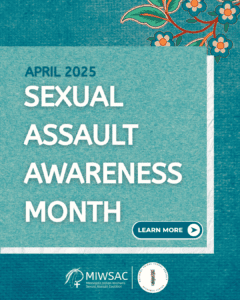April is Sexual Assault Awareness Month (SAAM). This month, we call attention to the widespread epidemic of sexual violence, its impact on everyone in our communities, and emphasize the importance of prevention work. MIWSAC has put together a SAAM Toolkit with downloadable social media graphics, sexual assault resources, events for the month, and more.
Sexual assault is a serious public health issue that affects individuals, families, and entire communities. Unfortunately, American Indian/Alaska Native (AI/AN) people experience sexual assault at significantly higher rates than the general population. As a result, it is imperative that sexual assault be addressed as a public health issue that affects our communities.
To address sexual assault against AI/AN people as a public health issue, it is important to take a multi-faceted approach and that culture is central as a healing and a protective factor.
- Increase awareness and education: Communities can increase awareness and education about sexual violence, its impact on individuals and communities, and how to prevent it. This can be done through public campaigns, community events, and educational programs in schools and other community settings. Think creatively about what has been done in the past as well as what are the current needs in your community! Engage with folks across your state/region to create change.
- Support survivors: Communities can provide support and resources for survivors of sexual violence, including access to medical care, mental health services, and advocacy. This can help survivors recover from the trauma of sexual violence and reduce the negative health consequences associated with it. This means that folks need to believe survivors as well as dedicate the time and resources to ensure that sexual violence receives the attention it needs, and isn’t overshadowed by domestic violence, sex trafficking, or MMIWR efforts. These are all important issues within communities, and each deserves suitable and specialized focus.
- Implement prevention strategies: Communities can implement prevention strategies that address the root causes of sexual violence, including poverty, substance abuse, and systemic inequalities. Prevention strategies can include interventions that target at-risk populations, such as youth, unhoused relatives, or justice involved individuals, and community-wide efforts to promote healthy relationships and respect for boundaries.
- Engage in policy advocacy: Communities can engage in policy advocacy to promote systemic change that addresses the root causes of sexual violence. This can involve advocating for increased funding for prevention and intervention programs, supporting policy changes that promote gender equality and address systemic inequalities, and advocating for increased accountability for perpetrators of sexual violence. This can be within your organization, within your Tribe, or on the national or state level.
- Foster a culture of respect and consent: Communities can foster a culture of respect and consent that promotes healthy relationships and respect for boundaries. This can involve community-wide efforts to challenge harmful attitudes and behaviors related to sexual violence, promote positive norms around consent and healthy relationships, and support survivors in their recovery. This is something that is both an individual practice and can be modeled in schools, Tribal governments, workplaces, and in many settings.
Advocate alongside MIWSAC throughout the month by using our SAAM Toolkit. Sexual violence is pervasive and important, not just during Sexual Assault Awareness Month, but year-round. By taking a comprehensive approach that includes education, prevention, support for survivors, policy advocacy, and fostering a culture of respect and consent, communities can address sexual violence from a public health perspective and promote the health and wellbeing of individuals and communities.


